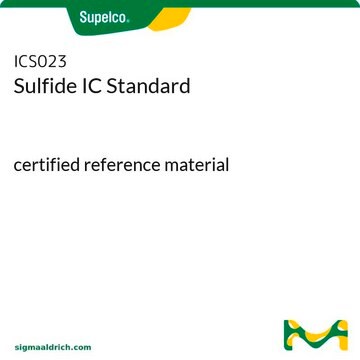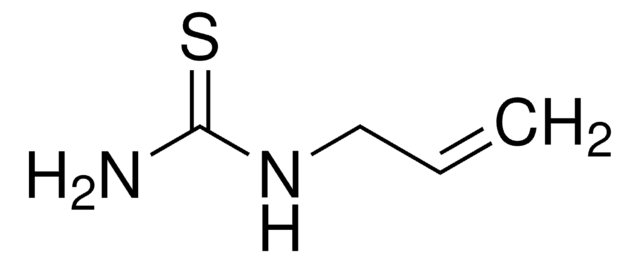71988
Sodium sulfite
BioUltra, anhydrous, ≥98% (RT)
Synonym(s):
Natrium sulfite
About This Item
Recommended Products
Quality Level
product line
BioUltra
Assay
≥98% (RT)
form
powder
impurities
insoluble matter, passes filter test
loss
≤0.1% loss on drying, 20 °C (HV)
pH
9.0-10.5 (25 °C, 1 M in H2O)
solubility
H2O: 1 M at 20 °C, clear, colorless
anion traces
chloride (Cl-): ≤50 mg/kg
thiosulfate (S2O32-): ≤200 mg/kg
cation traces
Al: ≤5 mg/kg
As: ≤0.1 mg/kg
Ba: ≤5 mg/kg
Bi: ≤5 mg/kg
Ca: ≤10 mg/kg
Cd: ≤5 mg/kg
Co: ≤5 mg/kg
Cr: ≤5 mg/kg
Cu: ≤5 mg/kg
Fe: ≤5 mg/kg
K: ≤200 mg/kg
Li: ≤5 mg/kg
Mg: ≤5 mg/kg
Mn: ≤5 mg/kg
Mo: ≤5 mg/kg
Ni: ≤5 mg/kg
Pb: ≤5 mg/kg
Sr: ≤5 mg/kg
Zn: ≤5 mg/kg
absorption
cut-off at 265 nm in H2O at 1 M
SMILES string
[Na+].[Na+].[O-]S([O-])=O
InChI
1S/2Na.H2O3S/c;;1-4(2)3/h;;(H2,1,2,3)/q2*+1;/p-2
InChI key
GEHJYWRUCIMESM-UHFFFAOYSA-L
Looking for similar products? Visit Product Comparison Guide
Application
- Tuning Structural Characteristics of Corn Stover Through Ammonium and Sodium Sulfite (ASS) Pretreatment for Enhanced Enzymatic Hydrolysis.: This study demonstrates the effective use of sodium sulfite in pretreating biomass to enhance its enzymatic breakdown, crucial for improving biofuel production efficiency (Chen X et al., 2024).
- A Soy Protein-Based Film Based on Chemical Treatment and Microcrystalline Cellulose Reinforcement Obtained from Corn Husk Byproducts.: Highlights the application of sodium sulfite in the development of biodegradable films, showcasing its potential in creating sustainable materials in the food packaging industry (Zhang B et al., 2024).
- Sodium Sulfite as a Novel Hypoxia Revulsant Involved in Hypoxic Regulation in Escherichia coli.: Investigates sodium sulfite′s role as a hypoxia revulsant, providing insights into its biochemical applications for managing bacterial growth under low oxygen conditions, relevant for biomedical research and microbial management (Ye Q et al., 2024).
- Modelling energy-harvesting processes in primitive cells: Proton transport across bilayers driven by the oxidation of sulfite.: Explores the potential of sodium sulfite in facilitating proton transport across biological membranes, which is crucial for understanding cellular energy mechanisms and could lead to advancements in bioenergy and synthetic biology (Paula S et al., 2024).
Other Notes
Storage Class Code
13 - Non Combustible Solids
WGK
WGK 1
Flash Point(F)
Not applicable
Flash Point(C)
Not applicable
Personal Protective Equipment
Choose from one of the most recent versions:
Already Own This Product?
Find documentation for the products that you have recently purchased in the Document Library.
Customers Also Viewed
Our team of scientists has experience in all areas of research including Life Science, Material Science, Chemical Synthesis, Chromatography, Analytical and many others.
Contact Technical Service







